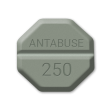
Antabuse
Antabuse is an aid in the management of selected chronic alcohol patients who want to remain in a state of enforced sobriety so that supportive and psychotherapeutic treatment may be applied to best advantage.
| Package | Per pill | Savings | Price | Order |
|---|---|---|---|---|
| 10 pills | $ 1.61 | $ 16.05 | ||
| 20 pills | $ 1.29 | $ 6.32 savings | $ 25.78 | |
| 30 pills | $ 1.07 | $ 16.00 savings | $ 32.15 | |
| 60 pills | $ 0.97 | $ 38.09 savings | $ 58.21 | |
| 90 pills | $ 0.92 | $ 61.58 savings | $ 82.87 | |
| 120 pills | $ 0.87 | $ 88.14 savings | $ 104.46 | |
| 180 pills | $ 0.82 | $ 140.49 savings | $ 148.41 | |
| 270 pills | $ 0.77 | $ 225.39 savings | $ 207.96 | |
| 360 pills | $ 0.74 | $ 311.32 savings | $ 266.48 |
| Package | Per pill | Savings | Price | Order |
|---|---|---|---|---|
| 10 pills | $ 1.98 | $ 19.80 | ||
| 20 pills | $ 1.78 | $ 3.92 savings | $ 35.68 | |
| 30 pills | $ 1.68 | $ 8.97 savings | $ 50.43 | |
| 60 pills | $ 1.63 | $ 20.95 savings | $ 97.85 | |
| 90 pills | $ 1.58 | $ 35.93 savings | $ 142.27 | |
| 120 pills | $ 1.53 | $ 53.98 savings | $ 183.62 | |
| 180 pills | $ 1.48 | $ 89.91 savings | $ 266.49 | |
| 270 pills | $ 1.44 | $ 145.78 savings | $ 388.82 | |
| 360 pills | $ 1.41 | $ 205.13 savings | $ 507.67 |
Description
Antabuse is an aid in the management of selected chronic alcohol patients who want to remain in a state of enforced sobriety so that supportive and psychotherapeutic treatment may be applied to best advantage. Antabuse is not a cure for alcoholism. When used alone, without proper motivation and supportive therapy, it is unlikely that it will have any substantive effect on the drinking pattern of the chronic alcoholic.
How To Take
Antabuse should never be administered until the patient has abstained from alcohol for at least 12 hours. In the first phase of treatment, a maximum of 500 mg daily is given in a single dose for one to two weeks. Although usually taken in the morning, disulfiram may be taken on retiring by patients who experience a sedative effect. Alternatively, to minimize, or eliminate, the sedative effect, dosage may be adjusted downward. The daily, uninterrupted administration of disulfiram must be continued until the patient is fully recovered socially and a basis for permanent self-control is established. Depending on the individual patient, maintenance therapy may be required for months or even years.
Precaution
Multiple cases of hepatitis, including both cholestatic and fulminant hepatitis, as well as hepatic failure resulting in transplantation or death, have been reported with administration of disulfiram. Occasional skin eruptions are, as a rule, readily controlled by concomitant administration of an antihistaminic drug. In a small number of patients, a transient mild drowsiness, fatigability, impotence, headache, acneform eruptions, allergic dermatitis, or a metallic or garlic-like aftertaste may be experienced during the first two weeks of therapy. These complaints usually disappear spontaneously with the continuation of therapy, or with reduced dosage.




















